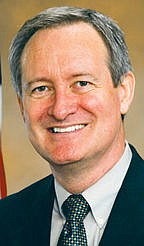A tribute to nation's atomic veterans
Veterans Day, as we honor Idaho veterans and military families, offers a fitting time to recognize the immense service of a too often overlooked group of veterans — our nation’s atomic veterans. I had the opportunity through a Congressional Record Statement to honor atomic veterans, including Idahoan Noelan ‘Mac’ McCormack for his efforts to ensure his fellow atomic veterans receive due recognition for their service and sacrifices. The following is an excerpt of the statement:
Mac McCormack of Coeur d’Alene, Idaho, served in the U.S. Marine Corps Test Unit #1, a unit active from 1954-1957 involved in specialized tactics, including warfare as it related to nuclear weapons. An atomic veteran is a veteran who, as part of his or her military service, participated in nuclear testing between 1945 and 1962, served in the U.S. military forces in or around Hiroshima and Nagasaki through mid-1946, or was held a prisoner of war in or near Hiroshima or Nagasaki.
Earlier this year, when designating July 16, 2021, as National Atomic Veterans Day, President Biden noted the considerable challenges atomic veterans have faced, “atomic veterans served our nation with distinction, but their service came at a great cost. Many developed health conditions due to radiation exposure, yet because they were not able to discuss the nature of their service, they were unable to seek medical care or disability compensation from the Department of Veterans Affairs for their illnesses.” Decades after their service, in 1996, Congress repealed the Nuclear Radiation and Secrecy Agreement Act, which enabled Atomic veterans to seek services and share their experiences. The U.S. Department of Veterans Affairs provides information to connect atomic veterans with medical services and compensation. However, the National Association of atomic veterans, Inc. notes, “Currently, there are approximately 195,000 atomic veteran across America who either do not know their oath-of-secrecy has been rescinded, and who are not aware of the potential monetary benefits due them for (service connected) radiation induced illnesses.”
While the best health care and other services in the world can never reverse what many Atomic veterans and their families have endured, we owe it to America’s service members who have answered the call to duty to ensure access to high-quality services and resources to support their commitment to our country. As part of this effort, I co-sponsored S.565, the Mark Takai Atomic Veterans Healthcare Parity Act, which would reclassify veterans who participated in the cleanup of the Enewetak Atoll as radiation-exposed veterans, making them eligible for the same benefits afforded to those covered by Radiation Exposure Compensation Act, RECA. Work also continues on bipartisan legislation to extend and expand RECA eligibility to those in Idaho and other states who have suffered from cancers related to fallout from nuclear weapons testing during the Cold War period of the 1950s and 1960s. As work continues on these and other efforts to support veterans, I join in honoring atomic veteran whose service has been a central part of our national defense. I hope recognition can also draw attention to available services and resources for atomic veteran.
In 1983, then-President Ronald Reagan urged fellow citizens to join him in appreciation of the service of atomic veteran he characterized as, “those patriotic Americans who through their participation in these tests helped lead the United States to the forefront of technology in defense of our great Nation and the freedoms we as Americans hold so dear.” Thank you, Mac McCormack, and your fellow atomic veteran, for your immeasurable and in many ways unrepayable service. I hope you know how deeply grateful we as a nation are for your patriotism.

